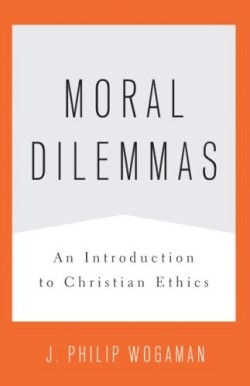Moral Dilemmas
An Introduction to Christian Ethics
What is the ultimate basis of the moral life? Does the moral life presuppose a deep spiritual reality? Is it religious in character? Or is it enough to think of ethics in purely philosophical or even just sociological terms? In this much shorter and more accessible follow-up to his acclaimed book, A Christian Method of Moral Judgment, Wogaman, former pastor to President Clinton and ethics professor at Wesley Theological Seminary, attempts to an answer these and other questions in this useful guidebook for Christian ethics. Wogaman argues that individuals establish their ethical values on the basis of certain moral presumptions. Individuals can then act on such presumptions to establish guidelines for their ethical behavior. For Wogaman, the moral presumptions of Christian ethics are “grace, the value of each human life, the unity of hu-mankind, equality, the goodness of creation.” Once he has established these moral presumptions, he explores the ways that they provide insights into moral decision-making about issues such as abortion, homo-sexuality, divorce, global warming, and economic globalization, among others. Wogaman offers an appendix in which he offers helpful advice in avoiding pitfalls in moral arguments. He reminds individuals engaged in moral discussions, for example, that “a single case is not sufficient basis for broad generalization” and that “not all opposing values or ideas are necessarily inconsistent with each other.” Although many will disagree with Wogaman that rules can govern ethical behavior, they will nevertheless find his little guidebook a helpful discussion of the nature of Christian ethics.
Reviewed by
Henry L. Carrigan
Disclosure: This article is not an endorsement, but a review. The publisher of this book provided free copies of the book to have their book reviewed by a professional reviewer. No fee was paid by the publisher for this review. Foreword Reviews only recommends books that we love. Foreword Magazine, Inc. is disclosing this in accordance with the Federal Trade Commission’s 16 CFR, Part 255.

